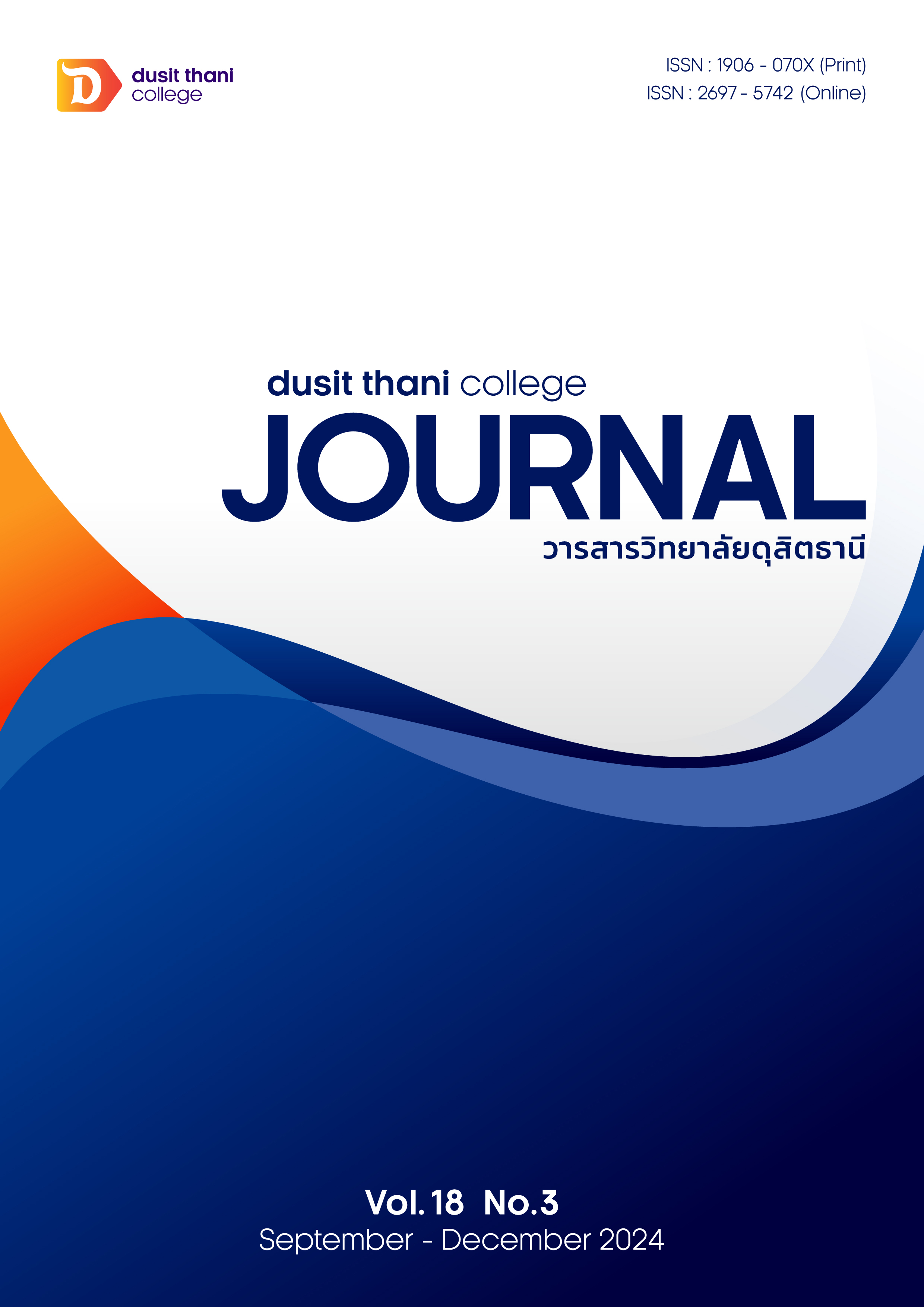การวิเคราะห์องค์ประกอบของประสบการณ์ทางประสาทสัมผัสในงานเทศกาล ทางวัฒนธรรมไทย
Main Article Content
บทคัดย่อ
การวิจัยครั้งนี้เป็นบริบทการออกแบบประสบการณ์ทางประสาทสัมผัสของงานเทศกาลทางวัฒนธรรมในประเทศไทย งานวิจัยมีวัตถุประสงค์เพื่อ 1) วิเคราะห์แนวโน้มโดยใช้เทคนิคการวิจัยอนาคต และ 2) วิเคราะห์องค์ประกอบเชิงสำรวจ เครื่องมือที่ใช้ในการวิจัย ได้แก่ 1) แบบสัมภาษณ์และแบบสอบถามของผู้เชี่ยวชาญ จำนวน 17 คน และ
2) แบบสอบถามความคิดเห็นของนักท่องเที่ยวเคยเข้าร่วมงานเทศกาลทางวัฒนธรรมในประเทศไทย จำนวน 310 คน การวิเคราะห์ข้อมูลโดยใช้กระบวนการทางสถิติ ได้แก่ มัธยฐาน ค่าพิสัยระหว่างควอไทล์ และวิเคราะห์องค์ประกอบเชิงสำรวจ
ผลการวิจัยพบว่า แนวโน้มการออกแบบประสบการณ์ทางประสาทสัมผัสในงานเทศกาลทางวัฒนธรรมในประเทศไทย สามารถสรุปออกมาได้เป็น 25 แนวโน้มหลักโดยแบ่งเป็น 5 ด้าน ซึ่งผู้เชี่ยวชาญมีฉันทามติร่วมกันในทุก ๆด้านในระดับมากขึ้นไป มีค่ามัธยฐานระหว่าง 4-5 และผลต่างระหว่างควอไทล์ที่ 3 และ 1 อยู่ระหว่าง 0-1 ส่วนการวิเคราะห์องค์ประกอบเชิงสำรวจพบว่า มีค่า KMO เท่ากับ 0.931 และจัดกลุ่มได้ 5 องค์ประกอบ ได้แก่ 1) ประสบการณ์ด้านการชิมรส 2) ประสบการณ์ด้านการได้ยิน 3) ประสบการณ์ด้านการสัมผัส 4) ประสบการณ์ด้านการดมกลิ่น และ 5) ประสบการณ์ด้านการมองเห็น โดยผลการวิจัยนี้จะเป็นประโยชน์แก่ผู้ที่เกี่ยวข้องกับการจัดงานเทศกาลในประเทศไทยในการประยุกต์ใช้เพื่อออกแบบและจัดกิจกรรมที่ช่วยสร้างประสบการณ์ทางประสาทสัมผัสให้กับผู้ร่วมงานได้
Article Details

อนุญาตภายใต้เงื่อนไข Creative Commons Attribution-NonCommercial-NoDerivatives 4.0 International License.
นโยบายการพิจารณากลั่นกรองบทความ
- บทความวิจัยและบทความวิชาการทุกเรื่องที่จะได้รับการตีพิมพ์ต้องผ่านการพิจารณากลั่นกรองโดยผู้ทรงคุณวุฒิ (Peer Review) ในสาขาที่เกี่ยวข้อง จำนวน 3 ท่าน/บทความ
- บทความ ข้อความ ภาพประกอบและตารางประกอบที่ลงตีพิมพ์ในวารสารเป็นความคิดเห็นส่วนตัวของผู้เขียน กองบรรณาธิการไม่จำเป็นต้องเห็นด้วยเสมอไป และไม่มีส่วนรับผิดชอบใด ๆ ถือเป็นความรับผิดชอบของผู้เขียนแต่เพียงผู้เดียว
- บทความที่จะได้รับการตีพิมพ์จะต้องไม่เคยตีพิมพ์ เผยแพร่ที่ใดมาก่อน และไม่อยู่ระหว่างการพิจารณาของวารสารฉบับอื่น หากตรวจสอบพบว่ามีการตีพิมพ์ซ้ำซ้อน ถือเป็นความรับผิดชอบของผู้เขียนแต่เพียงผู้เดียว
- บทความใดที่ผู้อ่านเห็นว่าได้มีการลอกเลียนหรือแอบอ้างโดยปราศจากการอ้างอิง หรือทำให้เข้าใจผิดว่าเป็นผลงานของผู้เขียน กรุณาแจ้งให้กองบรรณาธิการวารสารทราบจะเป็นพระคุณยิ่ง
เอกสารอ้างอิง
Berridge, G. (2007). Events Design and Experience. London: Routledge.
Comrey, A.L. and Lee, H.B. (1992). A First Course in Factor Analysis. New York: Psychology Press.
Dubois, D., Cance, C., Coler, M., Pate, A. and Guastavino, C. (2021). Sensory Experience: Exploring Meaning and The Senses. USA: John Benjamins Publishing Company.
Kachawangsie, A., Buakhao, S. and Puttipong, A. (2018). Retail Business Strategies Of Thailand Competitiveness in The ASEAN Economic Community. Valaya Alongkorn Review, 8(2), 141-155.
Panklan, K. (2018). Marketing Communication in Sensory Perception on Thai Dessert of Japanese Consumer in Tokyo, Japan. (Independence Study). Bangkok University, Bangkok.
Pulpattaracheewin, J. (2009). Future Research. Journal of the Association of Researchers, 13(2), 9 -13.
Pumma, N. and Rodsub, N. (2012). Nostalgia in Thai Tourism Industry. Mekong-Salween Civilization Studies Journal, 3(special), 47-59.
Rovinelli, R. J., and Hambleton, R. K. (1977). On the use of content specialists in the assessment of criterion-referenced test item validity. Dutch Journal of Educational Research, 2, 49-60.
Santichat, T., Jaroenwisan, K. and Boonmeesrisa-nga, M. (2021). Sensory Experience Creation for Cultural Festival in Thailand. Research & Development Journal, Loei Rajabhat University, 16(58), 1–12.
Singh, R. and Mehraj, N. (2019). Evaluating The Influence Of Destination Brand Experience On Tourist Behavioral Intention. A Pathmaking Journal, 9(2), 199-226.
Srisawat, P. and Kittayapong, J. (2018). Experiences of Customers who Use the Services of Creative Space “Chang Chui”. Proceeding of The 2nd UTCC Academic Day, University of Thai Chamber of Commerce, Bangkok, 1435-1446.
Stein, A. and Ramaseshan, B. (2016). Towards the Identification of Customer Experience Touch Point Elements. Journal of Retailing and Consumer Services, 30, 8-19.
Sukkorn, C. (2019). Cultural Tourism in Thailand. Journal of Sustainable Tourism Development, 1(2), 1-7.
Torabi, A., Hamidi, H. and Safaie, N. (2021). Effect of Sensory Experience on Customer Word-of-mouth Intention, Considering the Roles of Customer Emotions, Satisfaction, and Loyalty. International Journal of Engineering, 34(3), 682-699.
TAT Review Magazine. (2023). Situation of Domestic Tourism in Thailand 2022. Retrieve from https://tatreviewmagazine.com/article/situation2022


